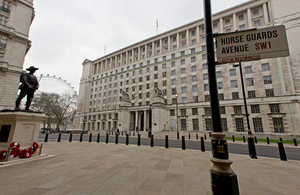REACT study shows fully vaccinated are three times less likely to be infected
- Findings covering 24 June to 12 July from Imperial College London and Ipsos MORI show fully vaccinated people were three times less likely than unvaccinated people to test positive for COVID-19
- Ministers urge caution as society opens up, with some fully vaccinated people still able to test positive
- Study shows infections have increased four-fold compared to the last report in late May, with 1 in 160 people infected, although growth appeared to be slowing
Findings from the latest report of REACT-1, one of the country’s largest studies into COVID-19 infections in England, have been published today (Wednesday 4 August) by Imperial College London and Ipsos MORI.
Over 98,000 volunteers took part in the study in England between 24 June and 12 July to examine the levels of COVID-19 in the general population. The latest data show infections in England have increased fourfold from 0.15% to 0.63% since the last REACT-1 report which covered the period 20 May to 7 June.
Despite this increase, the findings indicate the spread of the virus was slowing as of 12 July and infection rates for double vaccinated people are three times lower than in unvaccinated.
Analysis by Imperial College suggests double vaccinated people are also less likely to pass on the virus to others.
The main findings from the thirteenth round of the REACT-1 study show:
- 527 positives from 98,233 swabs, giving a prevalence of 0.63% or 1 in 160 people;
- more than a four-fold rise in prevalence compared to the last full report which covered 20 May-7 June, increasing from 0.15% to 0.63;
- unvaccinated people were three times more likely than fully vaccinated people to test positive for COVID-19, with prevalence at 1.21% and 0.40%;
- double vaccinated people in the most recent round were estimated to have around 50 to 60% reduced risk of infection, including asymptomatic infection, compared to unvaccinated people;
- those who were fully vaccinated may be less likely to pass on the virus to others than those who have not received a vaccine;
- prevalence was highest in London at 0.94%, up from 0.13% in round 12, although this growth appeared to be slowing at the end the study period;
- during Round 13, the R number was estimated at 1.19, corresponding to a doubling time of 25 days;
- of the 254 positive samples sequenced for variants, 100% were the Delta variant, compared to 78.3% in the last report at the end of May (round 12);
- a substantial increase in prevalence in all age groups under the age of 75;
- prevalence is nine-fold higher in 13-17 year-olds at 1.56% compared with 0.16% in round 12;
- 3.84% of double-vaccinated individuals who reported recent contact with a known COVID-19 case tested positive, compared to 7.23% of unvaccinated individuals; and
- when comparing the REACT infection data with official NHSE hospitalisation data, since mid-February there has been a weakening in the relationship between infections and hospitalisations and deaths. Since mid-April there are signs of the relationship between infections and hospitalisations coming back together. More time is needed to understand what this means and to identify any trends.
The vaccination programme has been successful in weakening the link between infection, hospitalisation and deaths and today’s data demonstrates the need to remain vigilant and follow government guidance, to ensure that we continue to reduce the risk.
Data from Public Health England (PHE) shows our vaccines are highly effective against all variants of COVID-19. The Pfizer/BioNTech vaccine is 96% effective and the Oxford/AstraZeneca vaccine is 92% effective against hospitalisation after both doses. PHE estimates that the vaccination programme in England has prevented 22 million infections, around 52,600 hospitalisations and between 35,200 and 60,000 deaths.
PHE hospitalisation data shows that between 21 June and 19 July, 1,788 people were admitted to hospital after testing positive for the Delta variant. Of these, 970 (54.3%) were unvaccinated, while 530 (29.6%) had received both doses of the vaccine. In total, 3,692 people have been hospitalised with the delta variant, of whom 2,152 (58.3%) were unvaccinated and 843 (22.8%) were fully vaccinated. The latest PHE risk assessment for the Delta variant reflects early signs of increased risk of reinfection with Delta compared to Alpha. Further investigations are being undertaken by PHE and data will be updated on Friday.
There are around 2.8 million 18-29-year olds who are completely unvaccinated. While the risk of getting seriously ill is lower among this group, it is becoming increasingly clear that individuals who are unvaccinated and catch the virus are more likely to pass it on to others, including those who are more vulnerable, when compared to someone who is fully vaccinated.
Health and Social Care Secretary Sajid Javid said:
Our vaccination rollout is building a wall of defence that means we can carefully ease restrictions and get back to the things we love, but we need to be cautious as we learn to live with this virus.
Today’s report shows the importance of taking personal responsibility by self-isolating if you are contact traced, getting tested if you have symptoms and wearing face coverings where appropriate.
I urge anyone who has yet to receive a vaccine to get jabbed and take up both doses – the vaccines are safe and they are working.
Vaccine Deployment Minister Nadhim Zahawi said:
Today’s results show the positive impact of the vaccination programme with those who are double jabbed three times less likely than unvaccinated people to get the virus and less likely to pass on this awful disease to those around them.
We must continue our phenomenal progress – my message to anyone who has not yet been vaccinated is please come forward, to protect yourself, your family and your community.
All those aged 18 and over can book their vaccination through the NHS booking service, and all adults have been offered their first dose.
At the end of September, by which point all those over the age of 18 will have had a chance to be fully vaccinated, the government plans to make full vaccination a condition of entry to high risk settings where large crowds gather and interact.
Professor Paul Elliott, director of the REACT programme from Imperial’s School of Public Health, said:
These findings confirm our previous data showing that both doses of a vaccine offer good protection against getting infected. However we can also see that there is still a risk of infection, as no vaccine is 100% effective, and we know that some double vaccinated people can still become ill from the virus. So even with the easing of restrictions, we should still act with caution to help protect one another and curb the rate of infections.
Kelly Beaver, Managing Director, Public Affairs at Ipsos MORI said:
Today’s results are a stark reminder of the importance of getting vaccinated against COVID-19, with those unvaccinated three times more likely to test positive in this round than those who are fully vaccinated. This is underscored by the indications in this report that fully vaccinated people are less likely to transmit the virus to others, an important development in understanding how we can beat the virus.
This report is the latest from the REACT-1 study which was commissioned by the Department of Health and Social Care and carried out by a world-class team of scientists, clinicians and researchers at Imperial College London, Imperial College Healthcare NHS Trust and Ipsos MORI.
Robust population surveillance studies like this are essential to understanding the rate of COVID-19 infection, how the virus is spreading across the country and the impact of measures taken to contain the virus in order to inform current and future actions.

